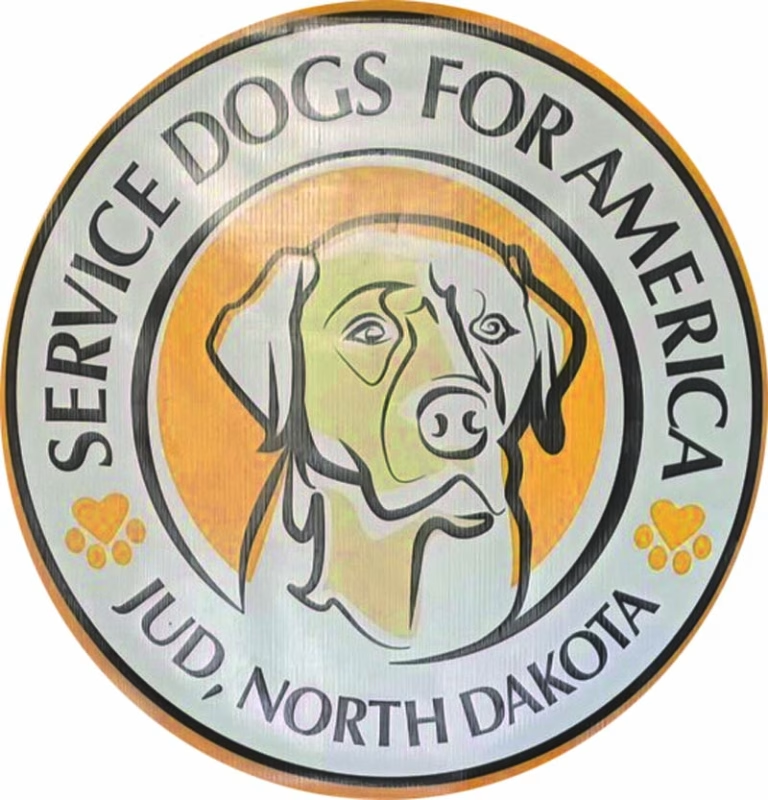In honor of our Veteran Special, we highlight the incredible work of Service Dogs for America and the profound impact their mission has on veterans across the country, including here in North Dakota. Service Dogs for America is a nonprofit organization committed to training and certifying service dogs for individuals with disabilities, including veterans living with conditions such as post-traumatic stress disorder, mobility impairments, or other challenges.
Their mission is to train and certify service dogs that can help individuals regain independence, improve emotional stability, increase confidence, and enhance overall quality of life. For many veterans, the work of Service Dogs for America provides essential support as they navigate the often difficult transition from military service to civilian life. Invisible wounds like PTSD can affect daily life, making simple tasks overwhelming. Service dogs trained through the organization can be a life-changing resource for those who need them most.
A service dog is much more than a companion. These dogs are professionally trained to perform tasks that directly mitigate the handler’s disability. For veterans, this can include sensing or interrupting panic attacks caused by PTSD, creating a protective presence in public to reduce anxiety, retrieving dropped items for those with physical impairments, or assisting in medical emergencies. Service Dogs for America trains dogs for mobility assistance, emergency medical response, and psychiatric support, including PTSD service dogs. Applicants must meet specific criteria, such as being at least eighteen years old, capable of caring for and handling a service dog independently, and for PTSD-related placements, actively engaged in therapy with a formal diagnosis. The dogs are trained to work in home, public, and workplace settings, performing tasks that help their handlers function more independently.
Beyond their training, service dogs entitle veterans to public access under the Americans with Disabilities Act, allowing them to bring their dogs into public spaces where pets are typically not allowed, as long as the dog is properly trained and performing its tasks. This combination of training, legal access, and companionship gives veterans the tools they need to participate fully in everyday life and regain a sense of normalcy.
An often overlooked aspect of service dog training is the involvement of prison-based inmate programs. Service Dogs for America operates the Inmate Canine Assistance Program, which allows incarcerated individuals to help train puppies that will become service dogs. Participants learn canine care, grooming, obedience training, behavior modification, and service dog tasks. Through this program, inmates gain responsibility and skills while the dogs receive socialization and intensive training. There are several correctional facility partnerships involved in the program. These programs benefit all parties involved. The dogs are well-prepared to serve veterans, the inmates gain valuable experience, and communities benefit from reduced recidivism and successful rehabilitation.
Similar programs run by organizations such as America’s VetDogs report that dogs raised in these environments are highly successful and that inmates report improved well-being. For veterans, this means receiving dogs that are not only well-trained but also socialized to handle the challenges of public and private life, making the bond between veteran and dog highly effective.
Additionally, research has shown the impact of service dogs for veterans is profound. Veterans paired with psychiatric service dogs report lower PTSD symptoms and higher psychosocial functioning than those who do not have service dogs. As an example of the broader impact of service dog programs, veteran Andrew Sockett received a service dog named Hercules through America’s VetDogs. He said, “He goes with me pretty much everywhere I go and helps provide that relief.” This example illustrates the transformative effect that a service dog can have in the life of a veteran. Service dogs provide more than assistance; they restore independence, increase social engagement, and offer emotional support that is often difficult to achieve through therapy or medication alone.
The work of organizations like Service Dogs for America has special relevance here in North Dakota. Rural distances, harsh winters, and limited access to specialized mental health resources can make reintegration challenging for veterans living in remote areas. The SDA campus in Jud, North Dakota provides local veterans with access to training and pairing, allowing them to receive support without traveling great distances. For veterans living in the region, this access can make the difference between remaining isolated and regaining full participation in daily life.
For veterans who have served their country and now face the challenges of physical or psychological wounds, Service Dogs for America offers more than assistance. They provide hope, independence, and a renewed sense of purpose. By training elite service dogs, partnering with correctional programs, and maintaining high standards for placement, Service Dogs for America ensures that veterans do more than survive, they thrive. This Veterans Day, it is important to recognize the dogs, the veterans, the inmates who help train them, the staff, and all those involved in making these life-changing connections possible. For every dog placed through Service Dogs for America, a veteran gains independence, hope, and the chance for a brighter future.













